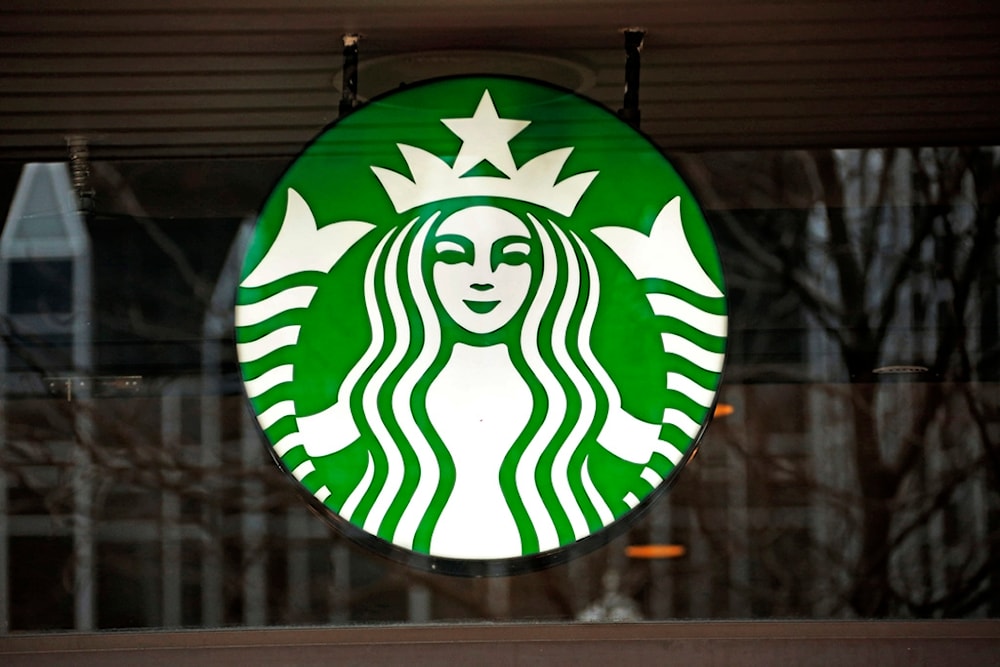Starbucks sales forecast reduced due to Gaza-linked boycott
Starbucks lowers its sales forecast due to boycotts in the US and the Middle East, shifting from a forecasted 10-12% growth to 7-10%.
-

This Thursday, Jan. 12, 2017, file photo shows a Starbucks logo sign in the window of one of the chain's cafes in Pittsburgh, US. (AP)
Starbucks has lowered its annual sales forecasts and failed to meet market expectations due to boycotts in both the US and the Middle East. The company reported a "significant impact on traffic and sales" in the Middle East after calls to boycott the brand began soon after the launch of the ongoing Israeli genocide in the Gaza Strip.
CEO Laxman Narasimhan mentioned during a post-quarterly earnings conference call that the boycott has affected the chain beyond the Middle East and in the United States as well.
Reports indicate that Starbucks has witnessed a decrease in customer traffic at its US stores starting in mid-November. Narasimhan stated that the company's performance during the first quarter of the 2024 fiscal year did not meet the projections set by analysts.
Starbucks reported figures that were lower than estimated across its business operations, despite a 5% increase in comparable sales in US stores. While the company achieved a record revenue of $9.43 billion in the first fiscal quarter of 2024, its sales outlook for the remainder of the year was downgraded due to weakening spending in Chinese and other markets.
Reports showed that instead of the previously forecasted revenue growth of 10% to 12%, the chain was now expected to grow between 7% and 10%.
Significantly, following the announcement of the results, Starbucks shares rose by 3%, possibly because investors had anticipated a worse financial performance. However, compared to a year ago, Starbucks shares were still 11% lower.
Boycotting works: Starbucks loses $11bln in market value
Earlier last month, and at the end of 2023, it was reported that Starbucks had lost almost $11 billion in market value, due to intense boycotts and employee strikes in support of Palestine, in addition to a lukewarm holiday promotion.
To counter the losses Starbucks surely predicted, and as the holidays approached, the corporation announced its Red Cup Day; a marketing strategy that gives consumers the chance to receive a free reusable holiday cup with every purchase. However, since the announcement of the promotion in mid-November, Starbucks saw a decline of 8.96 percent in its shares, which equals $10.98 billion in losses, the lowest it has ever experienced since 1992.
This was because of the recent global call to boycott brands and franchises that directly or indirectly benefit "Israel" economically. The Starbucks employee union was transparent in its support for Palestine, as "Israel" launched a genocide in Gaza in October, and took the opportunity to demand better work conditions, including scheduling and the freedom to negotiate contracts. Since then, employee strikes have been consistent.
As a result, the brand found that its reputation is at stake. Despite the loss in value, both economic and social, Starbucks CEO Laxman Narasimhan was positive Starbucks could turn its image back around and make a comeback from the "macroeconomic challenges" it has been facing.
However, the statistics then indicated otherwise, as the franchise's efforts were inconsistent with the results they had brought the years before. For example, last year, Red Cup Day resulted in an 81 percent increase in consumption compared to only a 31.7 percent increase this year.
Read more: How boycott of US brands over Gaza is boosting local businesses in ME

 3 Min Read
3 Min Read








